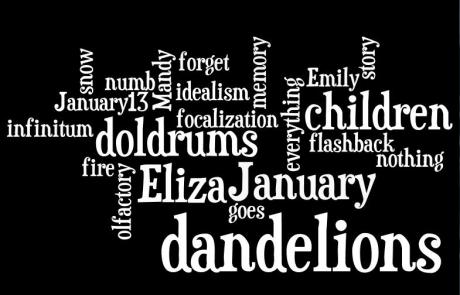Literary:
1. “I spent my life learning to feel less.
Every day I felt less.
Is that growing old? Or is it something worse?
You can not protect yourself from sadness without protecting yourself from happiness.” – Extremely Loud and Incredibly Close, Jonathan Safran Foer
Extremely Loud and Incredibly Close: Foer’s use of focalization through different characters; separate historical events and the affect they produce as a whole on one person; images as expressive of real emotion and virtual events. In terms of styling characters, the need to bury emotion or search for real answers to a senseless disaster. The discoloration of the world that Oskar experiences in his technicolor childhood.
2. “What’s the world for you anyway if you can’t make it up the way you want it?” – Jazz, Toni Morrison
Jazz: Toni Morrison’s technique of multiple narrations and the expression of a “community” of feeling; disjointed narratives and the meshing or clash of emotional understanding
3. “I’m skimming across the surface of my own history, moving fast, riding the melt beneath the blades, doing loops and spins, and when I take a high leap into the dark and come down thirty years later, I realize it is as Tim trying to save Timmy’s life with a story.”
“You’re a shadow. You slip out of your own skin, like molting, shedding your own history and your own future, leaving behind everything you ever were or wanted or believed in.”
“The thing about remembering is you don’t forget. You take your material where you find it, which is in your life, at the intersection of past and present. The memory-traffic feeds into a rotary up in your head, where it goes in circles for awhile, then pretty soon imagination flows in and the traffic merges and shoots off down a thousand streets. As a writer, all you can do is pick a street, and go for the ride, putting down things as they come to you. That’s the real obsession. All those stories.”
The Things They Carried: Tim O’Brien fashions a collection of narratives about the experiences of a senseless war on a platoon as disconnected from the “war effort” as fiction from reality. Attempting to make sense of an irrational event, he uses storytelling as a thematic approach to coping with a reality that is too unreasonable to swallow.
4. Frost, Robert. “Fire and Ice.” The Literature Network.
<http://www.online-literature.com/frost/744/>
“Some say the world will end in fire;
Some say in ice.
From what I’ve tasted of desire
I hold with those who favor fire.
But if it had to perish twice,
I think I know enough of hate
To say that for destruction ice
Is also great
And would suffice.”
Scholarly:
1. “Doldrums”. Dictionary.com. 7 Dec 2009 <http://dictionary.reference.com/browse/doldrums>.
Doldrums: noun (used with a plural verb )
)
| 1. | a state of inactivity or stagnation, as in business or art: August is a time of doldrums for many enterprises. |
| 2. | the doldrums,
|
| 3. | a dull, listless, depressed mood; low spirits. |
1795–1805; obs. dold stupid (see dolt ) + -rum(s) (pl.) n. suffix (see tantrum )

Synonyms:
3. depression, gloom, melancholy, dejection.
2. Eshelman, Sarah. “Olfaction and Memory”. Macalester College Behavioral Neuroscicence Department. 7 Dec 2009 <http://www.macalester.edu/psychology/whathap/ubnrp/smell/memory.html>.
“Olfaction is the sensory modality that is physically closest to the limbic system, of which the hippocampus and amygdala are a part, and which is responsible for emotions and memory. Indeed this may be why odor-evoked memories are unusually emotionally potent (1996).
It may be significant that olfactory neurons are unmyelinated, making olfaction the slowest of all the senses. It not only takes the brain longer to perceive olfactory stimuli; the sensation of an odor also persists for greater lengths of time than do sensations of vision or audition (1996). The fact that olfactory receptors are the only sensory receptors directly exposed to the environment may also help explain the relationship between olfaction and memory. Could it be that olfactory receptors most readily receive information from the physical world and therefore are readily able to code memories for things like emotion or events?”
Culture:
1. “Lump Sum” by Bon Iver; haunting vocals of loss, expressing the affect of burying emotion rather than “coping” with it. (Contemporary music video)
“Sold my cold knot
A heavy stone
Sold my red horse for a venture home
To vanish on the bow —
Settling slow
Fit it all, fit it in the doldrums
Or so the story goes”
2. The epitome of “pleasant” family, The Bradys
3. Robert Frost’s Fire and Ice
Some say the world will end in fire;
Some say in ice.
From what I’ve tasted of desire
I hold with those who favor fire.
But if it had to perish twice,
I think I know enough of hate
To say that for destruction ice
Is also great
And would suffice.
Multimedia:

Dandelions

Doldrums

GEESE





